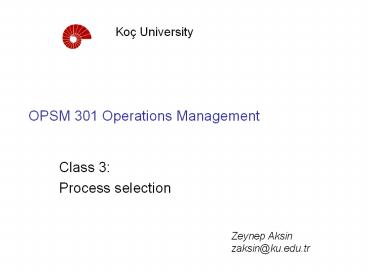OPSM 301 Operations Management - PowerPoint PPT Presentation
1 / 22
Title:
OPSM 301 Operations Management
Description:
Ko University OPSM 301 Operations Management Class 3: Process selection Zeynep Aksin zaksin_at_ku.edu.tr Process Selection Video Back to Shouldice wrap-up from last ... – PowerPoint PPT presentation
Number of Views:183
Avg rating:3.0/5.0
Title: OPSM 301 Operations Management
1
OPSM 301 Operations Management
Koç University
- Class 3
- Process selection
Zeynep Aksin zaksin_at_ku.edu.tr
2
- Process Selection Video
3
Back to Shouldice wrap-upfrom last class
4
Classification of Processes by process
architecture
- Project
- Job Shop
- Batch
- Line flow
- Continuous Flow
Job Shop Process-focused
Flow Shop Product-focused
5
Matching Process Choice with Strategy Product-Pr
ocess Matrix
6
Organization of Production Processes
- Project the product remains in a fixed location
- Manufacturing equipment is moved to the product
- Job shop (Workcenter) similar equipment or
functions are grouped together - Assembly line work processes are arranged
according to the progressive steps by which the
product is made - Continuous process assembly line, only the flow
is continuous such as with liquids
7
Project LayoutOne of a kind products are produced
8
The Job Shop Process
- Process Layout
- One of a Kind Build
- (To Customer Order)
- Absence of Rigid Flow Pattern
- Usually High Product Mix
9
The Job shopsimilar equipment or functions are
grouped together
- High variety, low volume production
Routing matrix based upon flow of parts
10
Process Layout
Lathe1
Lathe2
Drill Press 1
Paint Machine
Lathe3
Packaging Machine 1
Finish Production
Drill Press 2
Lathe4
Packaging Machine 2
Product 1735B Start of Production
11
Job-Shop Process Examples (Also called process
focused)
12
Process Focused Strategy - Pros Cons
- Advantages
- Greater product flexibility
- More general purpose equipment
- Lower initial capital investment
- Disadvantages
- High variable costs
- More highly trained personnel
- More difficult production planning control
- Low equipment utilization (5 to 25)
13
The Flow Line Process
- Product Layout
- Discrete Parts
- Rigid Flow Pattern
- Product Mix of Standard Products
14
Product Layout
Product 1735B
Start Production
Drill Press 1
Lathe
Packaging Machine 2
Drill Press 2
Paint Machine
Finish Production
15
Product-Focused Strategy Pros Cons
- Advantages
- Lower variable cost per unit
- Lower but more specialized labor skills
- Easier production planning and control
- Higher equipment utilization (70 to 90)
- Disadvantages
- Lower product flexibility
- More specialized equipment
- Usually higher capital investment
16
Positioning Inventory in the Supply Chain
Raw Material
Components
Semifinished
Finished
Make-to-Stock
Assemble-to-Order
SUPPLIER
CLIENT
Make-to-Order
Engineer-to-Order
Order
Forecast
17
Production Processes Terms
- Lead time the time needed to respond to a
customer order - Customer order decoupling point where inventory
is positioned to allow entities in the supply
chain to operate independently
18
Types of Firms
- Make-to-stock firms Firms that serve customers
from finished goods inventory - Assemble-to-order firms firms that combine a
number of preassembled modules to meet a
customers specifications - Make-to-order firms that make the customers
product from raw materials, parts, and components - Engineer-to-order firm firm that will work with
the customer to design and then make the product
19
Make to Stock
- Examples of products
- Televisions
- Clothing
- Packaged food products
- Essential issue in satisfying customers is to
balance the level of inventory against the level
of customer service - Easy with unlimited inventory but inventory costs
money - Trade-off between the costs of inventory and
level of customer service must be made
20
Assemble-to-Order
- A primary task is to define a customers order in
terms of alternative components since these are
carried in inventory - An example is the way Dell Computer makes their
desktop computers - One capability required is a design that enables
as much flexibility as possible in combining
components - There are significant advantages from moving the
customer order decoupling point from finished
goods to components
21
Make-to-Order and Engineer-to-Order
- Boeings process for making commercial aircraft
is an example - Customer order decoupling point could be in
either raw materials at the manufacturing site or
the supplier inventory - Depending on how similar the products are it
might not even be possible to pre-order parts
22
Assignment 1 from Universal Pulp and Paper
case-individual assignment
- Read the Universal Pulp and Paper (UPP) case from
the course pack (available at the photocopy
center) - What are the main products of UPP?
- Identify the four product attributes for each
product type. Explain each attribute with facts
from the case - Which process type is appropriate for each
product type? Support your argument with facts
from the case and process attributes you need for
each product type.































